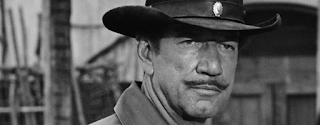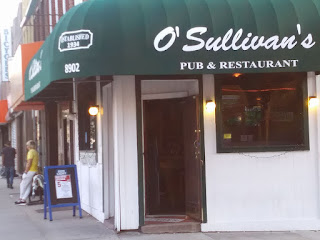Ditching the Girl
Maybe Erich Segal was wrong.
The film Love Story became famous for the catchphrase “Love never means never having to say you’re sorry,” and while the line made it to No. 13 on the American Film Institute’s list of 100 top movie quotes, I think there are times when a sincere apology can do wonders for a relationship.
I’ve been on a TV nostalgia ride for several months now thanks to the cable station known as MeTV, which presents a slew of old programs from my childhood.
It’s a blast seeing the work of famous actors, writers, directors early in their careers, but I must say these shows display a serious lack of diversity. In fact, it doesn’t exist at all in this world of all Caucasian male all the time.
And lately I’ve been picking up on some seriously hateful attitudes toward women in a couple of shows I otherwise enjoy.
Have Gun Will Travel is probably my favorite of the old TV westerns. For the young people out there, the show starred Richard Boone as Paladin, a kind of Renaissance gunman, who enjoys San Francisco’s opera and theater, but will quickly strap on his six-shooter and head out to the wildest parts of the wild west to fight for the weak and oppressed.
Unless he’s dating them, of course.
It seems that this sophisticated man about town has some rather sophomoric attitudes toward women. He takes a particular delight in ditching his date at the drop of a Stetson and galloping off to parts unknown.
There is a decided meanness in the way Paladin—and other TV heroes of the 50s and 60s—dump their ladies. The women are made to look like fools and dupes for having the nerve to expect these manly men to be loyal—or at least stick around for dessert.
And we, the viewers, are encouraged to participate in the derision that feels a lot like institutional misogyny.
A Knight Without Armor
What is manly about running out on someone who cares for you? Would it be so bad if Paladin sincerely apologized to these women before going off to shoot people?
How hard is it to say something along the lines of “I’m sorry, but something has come up and I’ve got to leave”?
We’ve been teaching children to do this ever since we started walking upright, yet the leading men of a certain era are allowed, even expected, to be crass and unfeeling to their girlfriends.
I saw one episode recently that opens with a furious woman shrieking at Paladin that he’s a cad, and a liar, and God knows what else.
It looks pretty serious until our “hero” literally whispers sweet nothings into this woman’s ear, causing an idiotic smile to spread over her face as she vacates the premises on a cloud of delusion.
Lady, you were right the first time. The guy is a cad.
The eponymous hero of Peter Gunn has only one woman to let down, but he does a pretty thorough job of it.
Edie Hart is his long-suffering girlfriend and the accent is on the suffering. He always seems to be ditching her to go clobber some loser, but he never thinks of apologizing.
She’s just expected to accept this insensitivity as part of the package.
Obviously, I’m looking at these shows from 50 years down the road, and—we hope—that attitudes are changing. I’m not calling for censorship or banning these shows, so please don't have a "political correctness" hissy fit.
I just can’t help but think of a generation of young men and boys who watched these programs when they were new and thought that this was the way you should treat women.
I know that I could’ve done a much better job because, to be brutally honest, there were too many times when I was insensitive, rude, and downright stupid to some of the women in my life.
Maybe these programs bother me so much because they hold a mirror up to my tarnished past.
I’m not blaming Paladin or Peter Gunn for my actions. I offer no excuses for my past behavior because there are none. Justifying your misdeeds only leaves the door opening to repeating them.
All I can say is that I am trying to do better in my golden years and if it takes an old cowboy program to keep me in line, well, I’ll gladly saddle up.
The film Love Story became famous for the catchphrase “Love never means never having to say you’re sorry,” and while the line made it to No. 13 on the American Film Institute’s list of 100 top movie quotes, I think there are times when a sincere apology can do wonders for a relationship.
I’ve been on a TV nostalgia ride for several months now thanks to the cable station known as MeTV, which presents a slew of old programs from my childhood.
It’s a blast seeing the work of famous actors, writers, directors early in their careers, but I must say these shows display a serious lack of diversity. In fact, it doesn’t exist at all in this world of all Caucasian male all the time.
And lately I’ve been picking up on some seriously hateful attitudes toward women in a couple of shows I otherwise enjoy.
Have Gun Will Travel is probably my favorite of the old TV westerns. For the young people out there, the show starred Richard Boone as Paladin, a kind of Renaissance gunman, who enjoys San Francisco’s opera and theater, but will quickly strap on his six-shooter and head out to the wildest parts of the wild west to fight for the weak and oppressed.
Unless he’s dating them, of course.
It seems that this sophisticated man about town has some rather sophomoric attitudes toward women. He takes a particular delight in ditching his date at the drop of a Stetson and galloping off to parts unknown.
There is a decided meanness in the way Paladin—and other TV heroes of the 50s and 60s—dump their ladies. The women are made to look like fools and dupes for having the nerve to expect these manly men to be loyal—or at least stick around for dessert.
And we, the viewers, are encouraged to participate in the derision that feels a lot like institutional misogyny.
A Knight Without Armor
What is manly about running out on someone who cares for you? Would it be so bad if Paladin sincerely apologized to these women before going off to shoot people?
How hard is it to say something along the lines of “I’m sorry, but something has come up and I’ve got to leave”?
We’ve been teaching children to do this ever since we started walking upright, yet the leading men of a certain era are allowed, even expected, to be crass and unfeeling to their girlfriends.
I saw one episode recently that opens with a furious woman shrieking at Paladin that he’s a cad, and a liar, and God knows what else.
It looks pretty serious until our “hero” literally whispers sweet nothings into this woman’s ear, causing an idiotic smile to spread over her face as she vacates the premises on a cloud of delusion.
Lady, you were right the first time. The guy is a cad.
The eponymous hero of Peter Gunn has only one woman to let down, but he does a pretty thorough job of it.
Edie Hart is his long-suffering girlfriend and the accent is on the suffering. He always seems to be ditching her to go clobber some loser, but he never thinks of apologizing.
She’s just expected to accept this insensitivity as part of the package.
Obviously, I’m looking at these shows from 50 years down the road, and—we hope—that attitudes are changing. I’m not calling for censorship or banning these shows, so please don't have a "political correctness" hissy fit.
I just can’t help but think of a generation of young men and boys who watched these programs when they were new and thought that this was the way you should treat women.
I know that I could’ve done a much better job because, to be brutally honest, there were too many times when I was insensitive, rude, and downright stupid to some of the women in my life.
Maybe these programs bother me so much because they hold a mirror up to my tarnished past.
I’m not blaming Paladin or Peter Gunn for my actions. I offer no excuses for my past behavior because there are none. Justifying your misdeeds only leaves the door opening to repeating them.
All I can say is that I am trying to do better in my golden years and if it takes an old cowboy program to keep me in line, well, I’ll gladly saddle up.





Comments
That's a good point. You do start to see some more diversity in the casting and some (slight?) improvement in the attitudes toward women in the Seventies.
Take care!
Back then they kept reinforcing that men were "men" and women were "women" and that men ruled. Which I think is hilarious because, personally, I think the reality is that women rule.
And you're right, women were not treated very well and made to look completely disposable.
This is why I will never watch a Quentin Tarantino movie. His depiction of women is horrendous. In fact, I once walked out of one of his stage plays (Reservoir Dogs) because I found the dialogue between the all-male cast despicable. All they did was sit around and rag on women.
Hope you're having a FAB week, buddy!
Good point--I forgot about Donna Reed!
What's so frustrating to me is that some of these old programs are actually pretty good, except that the display this terrible attitude toward women. Again, I know it's a long time ago when attitudes were different, but the flat out meanness is impossible to accept in any era.
Take care, buddy!